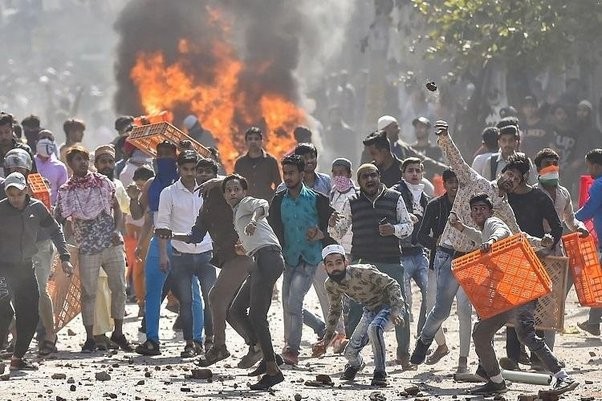In recent years, Balasore, situated along Odisha’s northern coast, has experienced a troubling rise in communal discord, marked by recurring incidents of violence targeting Hindus, allegedly perpetrated by Muslim groups. The most recent flare-up unfolded on 17 June, when tensions boiled over into communal riots. The catalyst was allegations of cow slaughter attributed to a faction within the Muslim community during Eid-Ul-Adha festivities. This incident not only exacerbated existing religious sensitivities but also underscored deeper societal fissures in the city. The clashes resulted in significant property damage and injuries, further straining inter-community relations in Balasore.
Trigger Events and Subsequent Violence
The trouble began when Hindus, deeply aggrieved by suspicions of cow slaughter near the revered Sufi mausoleum in Mallikashpur, gathered to voice their concerns. However, instead of addressing these grievances through dialogue, radical Muslim mobs responded with violence, attacking the protestors with weapons. This aggressive response escalated tensions, resulting in significant property damage and injuries in neighborhoods such as Golapokhari and Motiganj. The disproportionate use of force against demonstrators underscores the vulnerability in the face of communal tensions and highlights the urgent need for impartial law enforcement and community reconciliation efforts to ensure the safety and rights of all residents in Balasore.
Demographic Shifts and Communal Dynamics
The demographic transformation of Balasore has been profound, witnessing a notable rise in its Muslim population from around 9% in 2011 to approximately 15% today. Census data reveals that in 2011, there were about 12,995 Muslims in the city, a number that has surged to over 30,300. This demographic shift, largely fueled by illegal immigrants from Bengal, has not only reshaped the city’s social dynamics but has also intensified communal tensions. The influx of these illegal immigrants has sparked concerns among the native population about national security, identity and resource allocation.
Root Causes and Societal Impact
Sociologists and local politicians point to demographic changes as a key factor fueling communal unrest in Odisha. The influx of illegal immigrants, including suspected Rohingyas and Bengali-speaking Muslims from Bangladesh, has raised concerns among the native population, exacerbated by economic disparities and cultural differences. The city’s overall population has grown by approximately 40% over the past 13 years, while the Muslim population has surged by over 133% during the same period, highlighting the rapid demographic change in Balasore.
Political and Law Enforcement Challenges
Critics accuse the ruling Biju Janata Dal (BJD) of exploiting migrant communities for political gain, allegedly neglecting the security implications of unchecked migration. Reports suggest a lack of robust enforcement against criminal elements among the illegal immigrants, fostering a climate of impunity and recurring communal conflicts. The BJD’s alleged patronage of immigrant communities, including allocations for mosque and madrassa construction, has further polarized communal relations in the region.
Security Concerns and Future Measures
Law enforcement officials and experts emphasize the urgent need for surveillance and de-radicalization efforts among migrant communities. They advocate for stricter monitoring of religious institutions and educational facilities where extremist ideologies might be propagated, aiming to prevent further escalation of communal violence. The rise of radical Islamist groups among migrant populations poses a significant security challenge, with concerns over potential ties to broader terrorist networks and organized crime.
Conclusion
As Odisha grapples with these challenges, effective governance and community engagement are crucial to mitigating communal tensions and fostering social harmony. Addressing the root causes of demographic shifts and ensuring development opportunities are essential steps towards lasting peace and stability in the region. Balasore’s experience underscores the importance of proactive policies that promote and address the concerns of both migrant and native populations alike. Proper measures should be taken against illegal immigrants, as they can pose threats to national security and strain resource allocation. By fostering dialogue, implementing robust security measures, and promoting socio-economic integration, Odisha can pave the way for a more cohesive and resilient society.
ALSO READ: Derogatory comment by Politician on Nirmala Sitharaman: Bad Fortune, Widow and ……?
